Treezer Goode
The Curious Tale of a Wood that Needed the Trees
Thomas P. Harte
Saturday, 2022-06-04
cmd spark start cluster --instance=instance-1 --quietly
/ms/dist/python/PROJ/bin/python
/ms/dist/R/PROJ/bin/R
cmd spark start cluster --instance=instance-1 --quietly
Disclaimer
Disclaimer
Thomas P. Harte ("the Author") is providing this presentation and its contents ("the Content") for educational purposes only at the R in Finance Conference, Chicago, IL (2022-06-04). The Author is not a registered investment advisor and the Author does not purport to offer investment advice nor business advice. The opinions expressed in the Content are solely those of the Author, and do not necessarily represent the opinions of the Author's employer, nor any organization, committee or other group with which the Author is affiliated.
THE AUTHOR SPECIFICALLY DISCLAIMS ANY PERSONAL LIABILITY, LOSS OR RISK INCURRED AS A CONSEQUENCE OF THE USE AND APPLICATION, EITHER DIRECTLY OR INDIRECTLY, OF THE CONTENT. THE AUTHOR SPECIFICALLY DISCLAIMS ANY REPRESENTATION, WHETHER EXPLICIT OR IMPLIED, THAT APPLYING THE CONTENT WILL LEAD TO SIMILAR RESULTS IN A BUSINESS SETTING. THE RESULTS PRESENTED IN THE CONTENT ARE NOT NECESSARILY TYPICAL AND SHOULD NOT DETERMINE EXPECTATIONS OF FINANCIAL OR BUSINESS RESULTS.
The Noble
Command Line Interface
Address to the Nation
on
The State of the CLI
Depends on the OS/language
But…
A bit of a mess

Jackson Pollock Number 18 (1950)—oil and enamel on masonite
Guggenheim Museum, New York
Depends on the OS/language
- GNU
- Python
- Java
- Scala
- C++
- R?
GNU
# a pseudo-standard
cmd --help
cmd --version
GNU: Git
git --help | head -5
usage: git [--version] [--help] [-C <path>] [-c <name>=<value>]
[--exec-path[=<path>]] [--html-path] [--man-path] [--info-path]
[-p | --paginate | -P | --no-pager] [--no-replace-objects] [--bare]
[--git-dir=<path>] [--work-tree=<path>] [--namespace=<name>]
<command> [<args>]
Observation: DSL
- Domain-specific language ("DSL"): The language in which the DSL is written or presented
- Host language: The language in which the DSL is executed or processed
GNU
# a pseudo-standard
cmd --help
cmd --version
# subcommands
git init
git add
git commit -am
git log
GNU
git --help
usage: git [--version] [--help] [-C ] [-c =]
[--exec-path[=]] [--html-path] [--man-path] [--info-path]
[-p | --paginate | -P | --no-pager] [--no-replace-objects] [--bare]
[--git-dir=] [--work-tree=] [--namespace=]
[]
These are common Git commands used in various situations:
start a working area (see also: git help tutorial)
clone Clone a repository into a new directory
init Create an empty Git repository or reinitialize an existing one
work on the current change (see also: git help everyday)
add Add file contents to the index
mv Move or rename a file, a directory, or a symlink
restore Restore working tree files
rm Remove files from the working tree and from the index
sparse-checkout Initialize and modify the sparse-checkout
examine the history and state (see also: git help revisions)
bisect Use binary search to find the commit that introduced a bug
diff Show changes between commits, commit and working tree, etc
grep Print lines matching a pattern
log Show commit logs
show Show various types of objects
status Show the working tree status
grow, mark and tweak your common history
branch List, create, or delete branches
commit Record changes to the repository
merge Join two or more development histories together
rebase Reapply commits on top of another base tip
reset Reset current HEAD to the specified state
switch Switch branches
tag Create, list, delete or verify a tag object signed with GPG
collaborate (see also: git help workflows)
fetch Download objects and refs from another repository
pull Fetch from and integrate with another repository or a local branch
push Update remote refs along with associated objects
'git help -a' and 'git help -g' list available subcommands and some
concept guides. See 'git help ' or 'git help '
to read about a specific subcommand or concept.
See 'git help git' for an overview of the system.
GNU: Git subcommands
git commit --help | head -13
GIT-COMMIT(1) Git Manual
NAME
git-commit - Record changes to the repository
SYNOPSIS
git commit [-a | --interactive | --patch] [-s] [-v] [-u<mode>] [--amend]
[--dry-run] [(-c | -C | --fixup | --squash) <commit>]
[-F <file> | -m <msg>] [--reset-author] [--allow-empty]
[--allow-empty-message] [--no-verify] [-e] [--author=<author>]
[--date=<date>] [--cleanup=<mode>] [--[no-]status]
[-i | -o] [--pathspec-from-file=<file> [--pathspec-file-nul]]
[-S[<keyid>]] [--] [<pathspec>...]
Observation: Recursion

GNU: Git subcommand
git commit --help | head -13
GIT-COMMIT(1) Git Manual
NAME
git-commit - Record changes to the repository
SYNOPSIS
git commit [-a | --interactive | --patch] [-s] [-v] [-u<mode>] [--amend]
[--dry-run] [(-c | -C | --fixup | --squash) <commit>]
[-F <file> | -m <msg>] [--reset-author] [--allow-empty]
[--allow-empty-message] [--no-verify] [-e] [--author=<author>]
[--date=<date>] [--cleanup=<mode>] [--[no-]status]
[-i | -o] [--pathspec-from-file=<file> [--pathspec-file-nul]]
[-S[<keyid>]] [--] [<pathspec>...]
Observation: Treezer Goode

Þ Auld PyÞone
Python…
The way it used to be
Python: argparse
- "Batteries included"
- DSL?
Python: subcommands with argparse
cmd query host host_name
cmd query profile profile_name
cmd query environment environment_name
cmd add host host_name
cmd add profile profile_name
cmd add environment environment_name
cmd update host host_name
Python: subcommands with argparse (muchos fun!)
import argparse
from mock import Mock
parser = argparse.ArgumentParser()
subparsers = parser.add_subparsers()
query_group = subparsers.add_parser('query')
add_group = subparsers.add_parser('add')
update_group = subparsers.add_parser('update')
### query
subparsers = query_group.add_subparsers()
# query host
host_query = subparsers.add_parser('host')
# query host host_name
host_query.add_argument('host_name')
host_query.set_defaults(func=m.query_host)
# query profile
profile_query = subparsers.add_parser('profile')
# query profile profile_name
profile_query.add_argument('profile_name')
profile_query.set_defaults(func=m.query_profile)
# query environment
environment_query = subparsers.add_parser('environment')
# query environment environment_name
environment_query.add_argument('environment_name')
environment_query.set_defaults(func=m.query_environment)
### add
subparsers = add_group.add_subparsers()
# add host
host_add = subparsers.add_parser('host')
# add host host_name
host_add.add_argument('host_name')
host_add.set_defaults(func=m.add_host)
# add profile
profile_add = subparsers.add_parser('profile')
# add profile profile_name
profile_add.add_argument('profile_name')
profile_add.set_defaults(func=m.add_profile)
# add environment
environment_add = subparsers.add_parser('environment')
# add environment environment_name
environment_add.add_argument('environment_name')
environment_add.set_defaults(func=m.add_environment)
### update
subparsers = update_group.add_subparsers()
# update host
host_update = subparsers.add_parser('host')
# update host host_name
host_update.add_argument('host_name')
host_update.set_defaults(func=m.update_host)
profile_update = subparsers.add_parser('profile')
profile_update.add_argument('profile_name')
profile_update.set_defaults(func=m.update_profile)
environment_update = subparsers.add_parser('environment')
environment_update.add_argument('environment_name')
environment_update.set_defaults(func=m.update_environment)
options = parser.parse_args()
options.func(options)
print(m.method_calls)
Python: muchos fun :(
python lusis.py -h
usage: lusis.py [-h] {query,add,update} ...
positional arguments:
{query,add,update}
optional arguments:
-h, --help show this help message and exit
python lusis.py query -h
usage: lusis.py query [-h] {host,profile,environment} ...
positional arguments:
{host,profile,environment}
optional arguments:
-h, --help show this help message and exit
John E. ("lusis") Vincent
lusis/python argparse subcommand subparsers.py
Python: subcommands with argparse
cmd query host host_name
cmd query profile profile_name
cmd query environment environment_name
cmd add host host_name
cmd add profile profile_name
cmd add environment environment_name
cmd update host host_name
Observation: Imperative

Python: The CLI Renaissance
placclick
Python: plac
import plac
@plac.flg('list_') # avoid clash with builtin
@plac.flg('yield_') # avoid clash with keyword
@plac.opt('sys_') # avoid clash with a very common name
def main(list_, yield_=False, sys_=100):
print(list_)
print(yield_)
print(sys_)
if __name__ == '__main__':
plac.call(main)
bash$ python example13.py --help usage: example13.py [-h] [-l] [-y] [-s 100] optional arguments: -h, --help show this help message and exit -l, --list -y, --yield [False] -s 100, --sys 100 [100]
plac Python package that can generate command line parameters from function signatures
Python: click
import click
@click.command()
@click.option('--count', default=1, help='Number of greetings.')
@click.option('--name', prompt='Your name',
help='The person to greet.')
def hello(count, name):
"""Simple program that greets NAME for a total of COUNT times."""
for x in range(count):
click.echo(f"Hello {name}!")
if __name__ == '__main__':
hello()
bash$ python hello.py --help Usage: hello.py [OPTIONS] Simple program that greets NAME for a total of COUNT times. Options: --count INTEGER Number of greetings. --name TEXT The person to greet. --help Show this message and exit.
 Python package for creating beautiful command line interfaces in a composable way with as little code as necessary.
Python package for creating beautiful command line interfaces in a composable way with as little code as necessary.
It's the "Command Line Interface Creation Kit".
C/C++
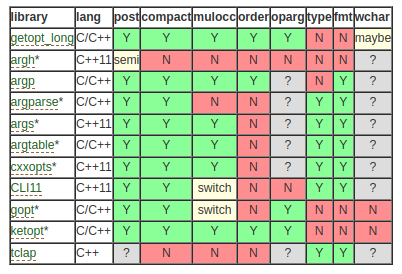
A survey of argument parsing libraries in C/C++ attractivechaos (2018-08-31)
C: argparse
#include
#include
#include
#include "argparse.h"
#define ARRAY_SIZE(x) (sizeof(x) / sizeof(x[0]))
static const char *const usages[] = {
"subcommands [options] [cmd] [args]",
NULL,
};
struct cmd_struct {
const char *cmd;
int (*fn) (int, const char **);
};
int
cmd_foo(int argc, const char **argv)
{
printf("executing subcommand foo\n");
printf("argc: %d\n", argc);
for (int i = 0; i < argc; i++) {
printf("argv[%d]: %s\n", i, *(argv + i));
}
int force = 0;
int test = 0;
const char *path = NULL;
struct argparse_option options[] = {
OPT_HELP(),
OPT_BOOLEAN('f', "force", &force, "force to do", NULL, 0, 0),
OPT_BOOLEAN('t', "test", &test, "test only", NULL, 0, 0),
OPT_STRING('p', "path", &path, "path to read", NULL, 0, 0),
OPT_END(),
};
struct argparse argparse;
argparse_init(&argparse, options, usages, 0);
argc = argparse_parse(&argparse, argc, argv);
printf("after argparse_parse:\n");
printf("argc: %d\n", argc);
for (int i = 0; i < argc; i++) {
printf("argv[%d]: %s\n", i, *(argv + i));
}
return 0;
}
int
cmd_bar(int argc, const char **argv)
{
printf("executing subcommand bar\n");
for (int i = 0; i < argc; i++) {
printf("argv[%d]: %s\n", i, *(argv + i));
}
return 0;
}
static struct cmd_struct commands[] = {
{"foo", cmd_foo},
{"bar", cmd_bar},
};
int
main(int argc, const char **argv)
{
struct argparse argparse;
struct argparse_option options[] = {
OPT_HELP(),
OPT_END(),
};
argparse_init(&argparse, options, usages, ARGPARSE_STOP_AT_NON_OPTION);
argc = argparse_parse(&argparse, argc, argv);
if (argc < 1) {
argparse_usage(&argparse);
return -1;
}
/* Try to run command with args provided. */
struct cmd_struct *cmd = NULL;
for (int i = 0; i < ARRAY_SIZE(commands); i++) {
if (!strcmp(commands[i].cmd, argv[0])) {
cmd = &commands[i];
}
}
if (cmd) {
return cmd->fn(argc, argv);
}
return 0;
}
argparse A command line arguments parsing library in C (compatible with C++)
C++: ArgumentParser
#include
#include
#include
#include // For printing SeqAn Strings.
#include
using namespace seqan;
int main(int argc, char const ** argv)
{
// Initialize ArgumentParser.
ArgumentParser parser("arg_parse_demo");
setCategory(parser, "Demo");
setShortDescription(parser, "Just a demo of the new ArgumentParser!");
setVersion(parser, "0.1");
setDate(parser, "Mar 2012");
// Add use and description lines.
addUsageLine(parser, "[\\fIOPTIONS\\fP] \\fIIN\\fP \\fIOUT\\fP ");
addDescription(
parser,
"This is just a little demo to show what ArgumentParser is "
"able to do. \\fIIN\\fP is a multi-FASTA input file. \\fIOUT\\fP is a "
"txt output file.");
// Add positional arguments and set their valid file types.
addArgument(parser, ArgParseArgument(ArgParseArgument::INPUT_FILE, "IN"));
addArgument(parser, ArgParseArgument(ArgParseArgument::OUTPUT_FILE, "OUT"));
setValidValues(parser, 0, "FASTA fa");
setValidValues(parser, 1, "txt");
// Add a section with some options.
addSection(parser, "Important Tool Parameters");
addOption(parser, ArgParseOption("", "id", "Sequence identity between [0.0:1.0]",
ArgParseArgument::DOUBLE, "ID"));
setRequired(parser, "id", true);
setMinValue(parser, "id", "0.0");
setMaxValue(parser, "id", "1.0");
// Adding a verbose and a hidden option.
addSection(parser, "Miscellaneous");
addOption(parser, ArgParseOption("v", "verbose", "Turn on verbose output."));
addOption(parser, ArgParseOption("H", "hidden", "Super mysterious flag that will not be shown in "
"the help screen or man page."));
hideOption(parser, "H");
// Add a Reference section.
addTextSection(parser, "References");
addText(parser, "http://www.seqan.de");
// Parse the arguments.
ArgumentParser::ParseResult res = parse(parser, argc, argv);
// Return if there was an error or a built-in command was triggered (e.g. help).
if (res != ArgumentParser::PARSE_OK)
return res == ArgumentParser::PARSE_ERROR; // 1 on errors, 0 otherwise
// Extract and print the options.
bool verbose = false;
getOptionValue(verbose, parser, "verbose");
std::cout < "Verbose: " < (verbose ? "on" : "off") < std::endl;
double identity = -1.0;
getOptionValue(identity, parser, "id");
std::cout < "Identity: " < identity < std::endl;
CharString inputFile, outputFile;
getArgumentValue(inputFile, parser, 0);
getArgumentValue(outputFile, parser, 1);
std::cout < "Input-File: " < inputFile < std::endl;
std::cout < "Output-File: " < outputFile < std::endl;
return 0;
}
ArgumentParser Parse the command line
Java: picocli
/**
* ASCII Art: Basic Picocli based sample application
* Explanation: Picocli quick guide
* Source Code: GitHub
* @author Andreas Deininger
*/
import picocli.CommandLine;
import picocli.CommandLine.Command;
import picocli.CommandLine.Option;
import picocli.CommandLine.Parameters;
import java.awt.Font;
import java.awt.Graphics;
import java.awt.Graphics2D;
import java.awt.RenderingHints;
import java.awt.image.BufferedImage;
@Command(name = "ASCIIArt", version = "ASCIIArt 1.0", mixinStandardHelpOptions = true) // |1|
public class ASCIIArt implements Runnable { // |2|
@Option(names = { "-s", "--font-size" }, description = "Font size") // |3|
int fontSize = 14;
@Parameters(paramLabel = "", defaultValue = "Hello, picocli", // |4|
description = "Words to be translated into ASCII art.")
private String[] words = { "Hello,", "picocli" }; // |5|
@Override
public void run() { // |6|
// https://stackoverflow.com/questions/7098972/ascii-art-java
BufferedImage image = new BufferedImage(144, 32, BufferedImage.TYPE_INT_RGB);
Graphics graphics = image.getGraphics();
graphics.setFont(new Font("Dialog", Font.PLAIN, fontSize));
Graphics2D graphics2D = (Graphics2D) graphics;
graphics2D.setRenderingHint(RenderingHints.KEY_TEXT_ANTIALIASING,
RenderingHints.VALUE_TEXT_ANTIALIAS_ON);
graphics2D.drawString(String.join(" ", words), 6, 24);
for (int y = 0; y < 32; y++) {
StringBuilder builder = new StringBuilder();
for (int x = 0; x < 144; x++)
builder.append(image.getRGB(x, y) == -16777216 ? " " : image.getRGB(x, y) == -1 ? "#" : "*");
if (builder.toString().trim().isEmpty()) continue;
System.out.println(builder);
}
}
public static void main(String[] args) {
int exitCode = new CommandLine(new ASCIIArt()).execute(args); // |7|
System.exit(exitCode); // |8|
}
}
picocli—a mighty tiny command line interface
Python-le-Nouveau
Subcommands & options
cmd hdfs stop
cmd hdfs start
cmd spark stop cluster --instance=instance-2 --verbose
cmd spark start cluster --instance=instance-1 --quietly
Python: pure data
view = {
}
Python: pure data
cmd spark stop cluster --instance=instance-2 --verbose
view = {
'spark|stop|cluster': {
},
}
Python: pure data
cmd spark stop cluster --instance=instance-2 --verbose
view = {
'spark|stop|cluster': {
'callback': spark_stop_cluster,
},
}
Python: pure data
cmd spark stop cluster --instance=instance-2 --verbose
view = {
'spark|stop|cluster': {
'callback': spark_stop_cluster,
'--instance': {
'help': 'Spark cluster instance',
'default': 'instance-1',
'choices': ['instance-1', 'instance-2'],
},
},
}
Observation: MVC
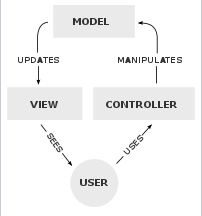
Python: View (pure data)
cmd spark start cluster --instance=instance-2 --verbose
cmd spark stop cluster --instance=instance-2 --verbose
view = {
'spark|start|cluster': {
'callback': spark_start_cluster,
'--instance': {
'help': 'Spark cluster instance',
'default': 'instance-1',
'choices': ['instance-1', 'instance-2'],
},
},
'spark|stop|cluster': {
'callback': spark_stop_cluster,
'--instance': {
'help': 'Spark cluster instance',
'default': 'instance-1',
'choices': ['instance-1', 'instance-2'],
},
},
}
Python: View (pure data)
view = {
'spark|start|cluster': {
'callback': spark_start_cluster,
'--instance': {
'help': 'Spark cluster instance',
'default': 'instance-1',
'choices': ['instance-1', 'instance-2'],
},
},
'spark|stop|cluster': {
'callback': spark_stop_cluster,
'--instance': {
'help': 'Spark cluster instance',
'default': 'instance-1',
'choices': ['instance-1', 'instance-2'],
},
},
}
Python: View (pure data)
view = {
'spark|start|cluster': {
'callback': spark_start_cluster,
'--instance': {
'help': 'Spark cluster instance',
'default': 'instance-1',
'choices': ['instance-1', 'instance-2'],
},
},
'spark|stop|cluster': {
'callback': spark_stop_cluster,
'--instance': {
'help': 'Spark cluster instance',
'default': 'instance-1',
'choices': ['instance-1', 'instance-2'],
},
},
'hdfs|start': {
'callback': hdfs_start,
'help': 'Start Hadoop',
},
'hdfs|stop': {
'callback': hdfs_stop,
'help': 'Stop Hadoop',
},
}
Python: complete program
import sys
from parsearg import ParseArg
from spark import (
spark_start_cluster,
spark_stop_cluster,
)
from hdfs import (
hdfs_start,
hdfs_stop,
)
view = {
'spark|start': {
'callback': spark_start_cluster,
'--instance': {
'help': 'Spark cluster instance',
'default': 'instance-1',
'choices': ['instance-1', 'instance-2'],
},
},
'spark|stop': {
'callback': spark_stop_cluster,
'--instance': {
'help': 'Spark cluster instance',
'default': 'instance-1',
'choices': ['instance-1', 'instance-2'],
},
},
'hdfs|start': {
'callback': hdfs_start,
'help': 'Start Hadoop',
},
'hdfs|stop': {
'callback': hdfs_stop,
'help': 'Stop Hadoop',
},
}
def main(args: list)-> None:
parser = ParseArg(view)
ns = parser.parse_args(args)
result = ns.callback(ns)
if __name__ == "__main__":
args = sys.argv[1:] if len(sys.argv) > 1 else []
main(' '.join(args))
Subcommands & options
cmd hdfs stop
cmd hdfs start
cmd spark stop cluster --instance=instance-2 --verbose
cmd spark start cluster --instance=instance-1 --quietly
Subcommands: reordered
cmd cluster stop hdfs
cmd cluster start hdfs
cmd cluster stop spark --instance=instance-2 --verbose
cmd cluster start spark --instance=instance-1 --quietly
Subcommands: reordered
cmd spark stop cluster --instance=instance-2 --verbose
cmd cluster stop spark --instance=instance-2 --verbose
Python: View—original order
cmd hdfs stop
cmd hdfs start
cmd spark stop cluster --instance=instance-2 --verbose
cmd spark start cluster --instance=instance-1 --quietly
view = {
'spark|start|cluster': {
'callback': spark_start_cluster,
'--instance': {
'help': 'Spark cluster instance',
'default': 'instance-1',
'choices': ['instance-1', 'instance-2'],
},
},
'spark|stop|cluster': {
'callback': spark_stop_cluster,
'--instance': {
'help': 'Spark cluster instance',
'default': 'instance-1',
'choices': ['instance-1', 'instance-2'],
},
},
'hdfs|start': {
'callback': hdfs_start,
'help': 'Start Hadoop',
},
'hdfs|stop': {
'callback': hdfs_stop,
'help': 'Stop Hadoop',
},
}
Python: View—reordered subcommands
cmd cluster stop hdfs
cmd cluster start hdfs
cmd cluster stop spark --instance=instance-2 --verbose
cmd cluster start spark --instance=instance-1 --quietly
view = {
'cluster|start|spark': {
'callback': spark_start_cluster,
'--instance': {
'help': 'Spark cluster instance',
'default': 'instance-1',
'choices': ['instance-1', 'instance-2'],
},
},
'cluster|stop|spark': {
'callback': spark_stop_cluster,
'--instance': {
'help': 'Spark cluster instance',
'default': 'instance-1',
'choices': ['instance-1', 'instance-2'],
},
},
'cluster|start|hdfs': {
'callback': hdfs_start,
'help': 'Start Hadoop',
},
'cluster|stop|hdfs': {
'callback': hdfs_stop,
'help': 'Stop Hadoop',
},
}
R
Subcommands & options
cmd hdfs stop
cmd hdfs start
cmd spark stop cluster --instance=instance-2 --verbose
cmd spark start cluster --instance=instance-1 --quietly
R: View (pure data)
view = list(
)
R: View (pure data)
view = list(
`spark|start|cluster` = list()
)
R: View (pure data)
view = list(
`spark|start|cluster` = list(
`callback` = spark_start_cluster
)
)
R: View (pure data)
view = list(
`spark|start|cluster` = list(
`callback` = spark_start_cluster,
`--instance` = list(
`help` = 'Spark cluster instance',
`default` = 'instance-1',
`choices` = c('instance-1', 'instance-2')
)
)
)
R: View (pure data)
view = list(
`spark|start|cluster` = list(
`callback` = spark_start_cluster,
`--instance` = list(
`help` = 'Spark cluster instance',
`default` = 'instance-1',
`choices` = c('instance-1', 'instance-2')
)
),
`spark|stop|cluster` = list(
`callback` = spark_stop_cluster,
`--instance` = list(
`help` = 'Spark cluster instance',
`default` = 'instance-1',
`choices` = c('instance-1', 'instance-2')
)
)
)
R: View (pure data)
view = list(
`spark|start|cluster` = list(
`callback` = spark_start_cluster,
`--instance` = list(
`help` = 'Spark cluster instance',
`default` = 'instance-1',
`choices` = c('instance-1', 'instance-2')
)
),
`spark|stop|cluster` = list(
`callback` = spark_stop_cluster,
`--instance` = list(
`help` = 'Spark cluster instance',
`default` = 'instance-1',
`choices` = c('instance-1', 'instance-2')
)
),
`hdfs|start` = list(
`callback` = hdfs_start,
`--instance` = list(
`help` = 'Start Hadoop'
)
),
`hdfs|stop` = list(
`callback` = hdfs_stop,
`--instance` = list(
`help` = 'Stop Hadoop'
)
)
)
R: complete program
#!/usr/bin/Rscript --no-init-file
suppressPackageStartupMessages(library(parsearg))
`spark_start_cluster`<- function(args)
cat(sprintf("starting Spark cluster instance=%s", args.instance)),
`spark_stop_cluster`<- function(args)
cat(sprintf("stopping Spark cluster instance=%s", args.instance)),
`hdfs_start`<- function(args)
cat(sprintf("starting HDFS cluster instance=%s", args.instance)),
`hdfs_stop`<- function(args)
cat(sprintf("stopping HDFS cluster instance=%s", args.instance)),
view = list(
`spark|start|cluster` = list(
`callback` = spark_start_cluster,
`--instance` = list(
`help` = 'Spark cluster instance',
`default` = 'instance-1',
`choices` = c('instance-1', 'instance-2')
)
),
`spark|stop|cluster` = list(
`callback` = spark_stop_cluster,
`--instance` = list(
`help` = 'Spark cluster instance',
`default` = 'instance-1',
`choices` = c('instance-1', 'instance-2')
)
),
`hdfs|start` = list(
`callback` = hdfs_start,
`--instance` = list(
`help` = 'Start Hadoop'
)
),
`hdfs|stop` = list(
`callback` = hdfs_stop,
`--instance` = list(
`help` = 'Stop Hadoop'
)
)
)
`main`<- function(args=commandArgs(trailingOnly=TRUE)) {
parser<- ParseArg(view)
ns<- parser$parse_args(args)
result<- ns$callback(ns)
}
main()
R: complete program (alt)
#!/usr/bin/Rscript --no-init-file
suppressPackageStartupMessages(library(parsearg))
`spark_start_cluster`<- function(args)
cat(sprintf("starting Spark cluster instance=%s", args.instance)),
`spark_stop_cluster`<- function(args)
cat(sprintf("stopping Spark cluster instance=%s", args.instance)),
`hdfs_start`<- function(args)
cat(sprintf("starting HDFS cluster instance=%s", args.instance)),
`hdfs_stop`<- function(args)
cat(sprintf("stopping HDFS cluster instance=%s", args.instance)),
view = list(
`spark|start|cluster` = list(
`callback` = spark_start_cluster,
`--instance` = list(
`help` = 'Spark cluster instance',
`default` = 'instance-1',
`choices` = c('instance-1', 'instance-2')
)
),
`spark|stop|cluster` = list(
`callback` = spark_stop_cluster,
`--instance` = list(
`help` = 'Spark cluster instance',
`default` = 'instance-1',
`choices` = c('instance-1', 'instance-2')
)
),
`hdfs|start` = list(
`callback` = hdfs_start,
`--instance` = list(
`help` = 'Start Hadoop'
)
),
`hdfs|stop` = list(
`callback` = hdfs_stop,
`--instance` = list(
`help` = 'Stop Hadoop'
)
)
)
args<- commandArgs(trailingOnly=TRUE)
parser<- ParseArg(view)
ns<- parser$parse_args(args)
result<- ns$callback(ns)
Observations
- DSL:
- positional arguments
- options
- subcommands
- Recursion: subcommands
- Tree: hierarchy + terminating case
- Declarative not Imperative: pure data
- MVC: separation of concerns
University of CLI
UCLI @ DSL
argparse: Python
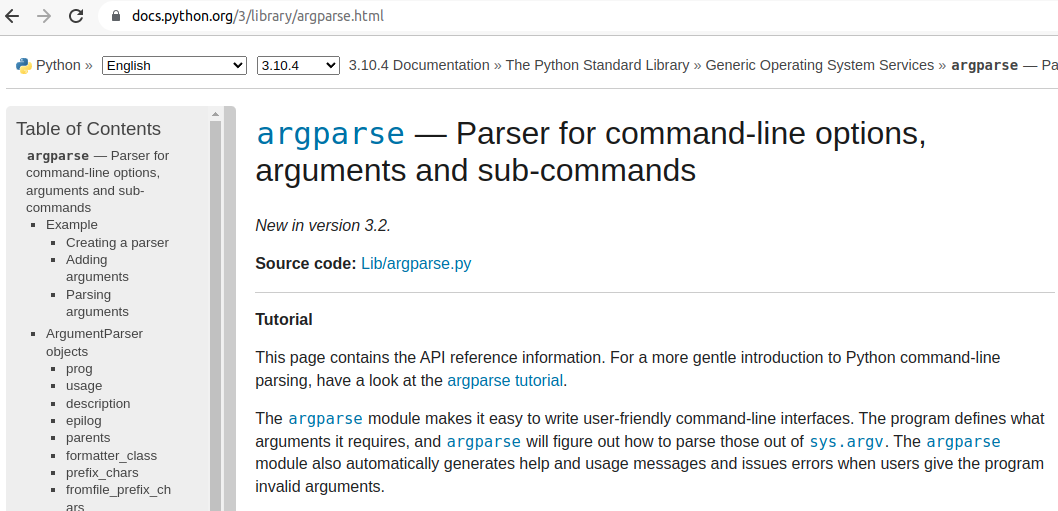
argparse: R
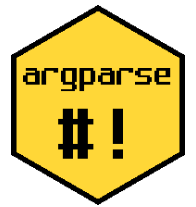
parsearg: Python, R
Canonical example
#!/usr/bin/Rscript --no-init-file library(argparse) `square`<- function(args) { parser<- ArgumentParser() parser$add_argument("number", type="integer", help="display the square of a given number" ) parser$add_argument("-v", "--verbosity", action="count", default=0, help="increase output verbosity" ) args<- parser$parse_args(args) answer<- args$number^2 if (args$verbosity > 2) { o<- capture.output(example("^")) cat(sprintf("[verbosity level == %d]:\n", args$verbosity)) cat(sprintf( "the square of %d equals %d, using the in-built arithmetic operator '^':\n", args$number, answer )) cat(sprintf("%s\n", o)) } else if (args$verbosity == 2) { cat(sprintf("[verbosity level == %d]:\n", args$verbosity)) cat(sprintf("the square of %d equals %d\n", args$number, answer)) } else if (args$verbosity == 1) { cat(sprintf("the square of %d is %d\n", args$number, answer)) } else { cat(sprintf("answer = %d\n", answer)) } } square(args=commandArgs(trailingOnly=TRUE))bash$ R --no-init-file R version 4.2.0 (2022-04-22) -- "Vigorous Calisthenics" Copyright (C) 2022 The R Foundation for Statistical Computing Platform: x86_64-pc-linux-gnu (64-bit) R is free software and comes with ABSOLUTELY NO WARRANTY. You are welcome to redistribute it under certain conditions. Type 'license()' or 'licence()' for distribution details. Natural language support but running in an English locale R is a collaborative project with many contributors. Type 'contributors()' for more information and 'citation()' on how to cite R or R packages in publications. Type 'demo()' for some demos, 'help()' for on-line help, or 'help.start()' for an HTML browser interface to help. Type 'q()' to quit R. > source('square') > square('4') > square('4 -v') > square('4 -vv') > square('4 -vvvv')bash$ square 4 bash$ square 4 -v bash$ square 4 -vv bash$ square 4 -vvvvbash$ ./square 2 answer = 4 bash$ ./square 2 -v the square of 2 is 4 bash$ ./square 2 -vv [verbosity level == 2]: the square of 2 equals 4 bash$ ./square 2 -vvv [verbosity level == 3]: the square of 2 equals 4, using the in-built arithmetic operator '^': ^> x <- -1:12 ^> x + 1 [1] 0 1 2 3 4 5 6 7 8 9 10 11 12 13 ^> 2 * x + 3 [1] 1 3 5 7 9 11 13 15 17 19 21 23 25 27 ^> x %% 2 #-- is periodic [1] 1 0 1 0 1 0 1 0 1 0 1 0 1 0 ^> x %/% 5 [1] -1 0 0 0 0 0 1 1 1 1 1 2 2 2 ^> x %% Inf # now is defined by limit (gave NaN in earlier versions of R) [1] Inf 0 1 2 3 4 5 6 7 8 9 10 11 12
Command-line arguments
DEFINITION. A command line comprises command-line arguments:
The essence of an argument parser
The essence of an argument parser
-> parser argument -> variable name
The essence of an argument parser
-> variable name
The essence of an argument parser
-> handle the event
The essence of an argument parser
Command-line arguments: Unnamed
bash$ square 3.141593
^^^^^^^^ # UNNAMED command-line argument:
# it is not named on the command line;
# the "event" is determined by its position
Command-line arguments: Unnamed
#!/usr/bin/Rscript --no-init-file
library(argparse)
`square`<- function(args) {
parser<- ArgumentParser()
parser$add_argument("number",
type="integer",
help="display the square of a given number"
)
parser$add_argument("-v", "--verbosity",
action="count",
default=0,
help="increase output verbosity"
)
args<- parser$parse_args(args)
answer<- args$number^2
if (args$verbosity > 2) {
o<- capture.output(example("^"))
cat(sprintf("[verbosity level == %d]:\n", args$verbosity))
cat(sprintf(
"the square of %d equals %d, using the in-built arithmetic operator '^':\n",
args$number, answer
))
cat(sprintf("%s\n", o))
}
else if (args$verbosity == 2) {
cat(sprintf("[verbosity level == %d]:\n", args$verbosity))
cat(sprintf("the square of %d equals %d\n", args$number, answer))
}
else if (args$verbosity == 1) {
cat(sprintf("the square of %d is %d\n", args$number, answer))
}
else {
cat(sprintf("answer = %d\n", answer))
}
}
square(args=commandArgs(trailingOnly=TRUE))
Command-line arguments: Named
bash$ square -n 3.141593
^^ # SHORT ARG
bash$ square -n=3.141593
^^ # SHORT ARG
bash$ square -number 3.141593
^^^^^^^ # FLAG
bash$ square --number=3.141593
^^^^^^^^ # FLAG
Command-line arguments: Named
#!/usr/bin/Rscript --no-init-file
library(argparse)
`square`<- function(args) {
parser<- ArgumentParser()
parser$add_argument("-n", "--number",
type="integer",
help="display the square of a given number"
)
parser$add_argument("-v", "--verbosity",
action="count",
default=0,
help="increase output verbosity"
)
args<- parser$parse_args(args)
answer<- args$number^2
if (args$verbosity > 2) {
o<- capture.output(example("^"))
cat(sprintf("[verbosity level == %d]:\n", args$verbosity))
cat(sprintf(
"the square of %d equals %d, using the in-built arithmetic operator '^':\n",
args$number, answer
))
cat(sprintf("%s\n", o))
}
else if (args$verbosity == 2) {
cat(sprintf("[verbosity level == %d]:\n", args$verbosity))
cat(sprintf("the square of %d equals %d\n", args$number, answer))
}
else if (args$verbosity == 1) {
cat(sprintf("the square of %d is %d\n", args$number, answer))
}
else {
cat(sprintf("answer = %d\n", answer))
}
}
square(args=commandArgs(trailingOnly=TRUE))
Command-line arguments: Named
#!/usr/bin/Rscript --no-init-file
library(argparse)
`square`<- function(args) {
parser<- ArgumentParser()
parser$add_argument("-n", "--number",
type="integer",
help="display the square of a given number",
dest="number_to_square"
)
parser$add_argument("-v", "--verbosity",
action="count",
default=0,
help="increase output verbosity"
)
args<- parser$parse_args(args)
answer<- args$number_to_square^2
if (args$verbosity > 2) {
o<- capture.output(example("^"))
cat(sprintf("[verbosity level == %d]:\n", args$verbosity))
cat(sprintf(
"the square of %d equals %d, using the in-built arithmetic operator '^':\n",
args$number_to_square, answer
))
cat(sprintf("%s\n", o))
}
else if (args$verbosity == 2) {
cat(sprintf("[verbosity level == %d]:\n", args$verbosity))
cat(sprintf("the square of %d equals %d\n", args$number_to_square, answer))
}
else if (args$verbosity == 1) {
cat(sprintf("the square of %d is %d\n", args$number_to_square, answer))
}
else {
cat(sprintf("answer = %d\n", answer))
}
}
square(args=commandArgs(trailingOnly=TRUE))
Positional and non-positional arguments
ArgumentParser.add_argument(
name or flags...
[, action]
[, nargs]
[, const]
[, default]
[, type]
[, choices]
[, required]
[, help]
[, metavar]
[, dest]
)
Define how a single command-line argument should be parsed. Each parameter
has its own more detailed description below, but in short they are:
name or flags - Either a name or a list of option strings,
e.g. foo or -f, --foo.
action - The basic type of action to be taken when this argument is
encountered at the command line.
nargs - The number of command-line arguments that should be consumed.
const - A constant value required by some action and nargs selections.
default - The value produced if the argument is absent from the command line.
type - The type to which the command-line argument should be converted.
choices - A container of the allowable values for the argument.
required - Whether or not the command-line option may be omitted
(optionals only).
help - A brief description of what the argument does.
metavar - A name for the argument in usage messages.
dest - The name of the attribute to be added to the object returned
by parse_args().
Positional and non-positional arguments
Positional and non-positional arguments
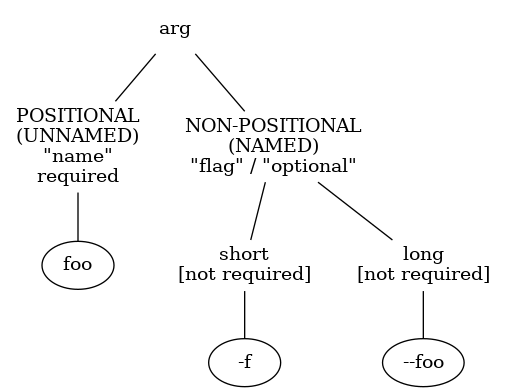
Unnamed and named arguments

Arguments to add_arguments
ArgumentParser.add_argument( name or flags... [, action] [, nargs] [, const] [, default] [, type] [, choices] [, required] [, help] [, metavar] [, dest] ) Define how a single command-line argument should be parsed. Each parameter has its own more detailed description below, but in short they are: name or flags - Either a name or a list of option strings, e.g. foo or -f, --foo. action - The basic type of action to be taken when this argument is encountered at the command line. nargs - The number of command-line arguments that should be consumed. const - A constant value required by some action and nargs selections. default - The value produced if the argument is absent from the command line. type - The type to which the command-line argument should be converted. choices - A container of the allowable values for the argument. required - Whether or not the command-line option may be omitted (optionals only). help - A brief description of what the argument does. metavar - A name for the argument in usage messages. dest - The name of the attribute to be added to the object returned by parse_args().#!/usr/bin/Rscript --no-init-file library(argparse) `square`<- function(args) { parser<- ArgumentParser() parser$add_argument("-n", "--number", type="integer", help="display the square of a given number", dest="number_to_square" ) parser$add_argument("-v", "--verbosity", action="count", default=0, help="increase output verbosity" ) args<- parser$parse_args(args) answer<- args$number_to_square^2 if (args$verbosity > 2) { o<- capture.output(example("^")) cat(sprintf("[verbosity level == %d]:\n", args$verbosity)) cat(sprintf( "the square of %d equals %d, using the in-built arithmetic operator '^':\n", args$number_to_square, answer )) cat(sprintf("%s\n", o)) } else if (args$verbosity == 2) { cat(sprintf("[verbosity level == %d]:\n", args$verbosity)) cat(sprintf("the square of %d equals %d\n", args$number_to_square, answer)) } else if (args$verbosity == 1) { cat(sprintf("the square of %d is %d\n", args$number_to_square, answer)) } else { cat(sprintf("answer = %d\n", answer)) } } square(args=commandArgs(trailingOnly=TRUE))
DSL: additional arguments
(
name or flags...
[, callback]
[, local]
[, action]
[, nargs]
[, const]
[, default]
[, type]
[, choices]
[, required]
[, help]
[, metavar]
[, dest]
)
DSL: keys
view = list(
`spark|start|cluster` = list(
`callback` = spark_start_cluster,
`--instance` = list(
`help` = 'Spark cluster instance',
`default` = 'instance-1',
`choices` = c('instance-1', 'instance-2')
)
),
`spark|stop|cluster` = list(
`callback` = spark_stop_cluster,
`--instance` = list(
`help` = 'Spark cluster instance',
`default` = 'instance-1',
`choices` = c('instance-1', 'instance-2')
)
),
`hdfs|start` = list(
`callback` = hdfs_start,
`--instance` = list(
`help` = 'Start Hadoop'
)
),
`hdfs|stop` = list(
`callback` = hdfs_stop,
`--instance` = list(
`help` = 'Stop Hadoop'
)
)
)
DSL: keys
start|spark|cluster start -> spark -> cluster
A|B|C A -> B -> C parsearg is in unflattening the flat tree into a tree of argparse parsers
DSL: unflattening

UCLI @ Recursion & Trees
Heterogeneous trees: recursive data structures
An heterogeneous tree is either:
Trees: Flat & Unflattened
cmd hdfs stop
cmd hdfs start
cmd spark stop cluster --instance=instance-2 --verbose
cmd spark start cluster --instance=instance-1 --quietly
view = {
'spark|start|cluster': {
'callback': spark_start_cluster,
'--instance': {
'help': 'Spark cluster instance',
'default': 'instance-1',
'choices': ['instance-1', 'instance-2'],
},
},
'spark|stop|cluster': {
'callback': spark_stop_cluster,
'--instance': {
'help': 'Spark cluster instance',
'default': 'instance-1',
'choices': ['instance-1', 'instance-2'],
},
},
'hdfs|start': {
'callback': hdfs_start,
'help': 'Start Hadoop',
},
'hdfs|stop': {
'callback': hdfs_stop,
'help': 'Stop Hadoop',
},
}
Trees: Flat & Unflattened
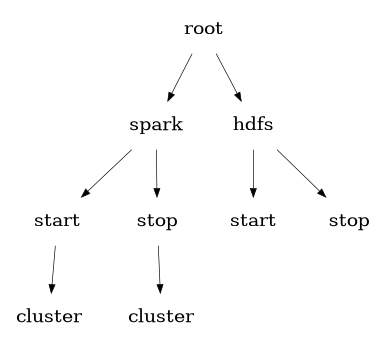
Trees: Flat & Unflattened
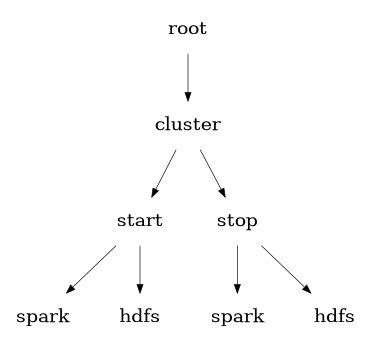
Trees: Flat & Unflattened
cmd cluster stop hdfs
cmd cluster start hdfs
cmd cluster stop spark --instance=instance-2 --verbose
cmd cluster start spark --instance=instance-1 --quietly
view = {
'cluster|start|spark': {
'callback': spark_start_cluster,
'--instance': {
'help': 'Spark cluster instance',
'default': 'instance-1',
'choices': ['instance-1', 'instance-2'],
},
},
'cluster|stop|spark': {
'callback': spark_stop_cluster,
'--instance': {
'help': 'Spark cluster instance',
'default': 'instance-1',
'choices': ['instance-1', 'instance-2'],
},
},
'cluster|start|hdfs': {
'callback': hdfs_start,
'help': 'Start Hadoop',
},
'cluster|stop|hdfs': {
'callback': hdfs_stop,
'help': 'Stop Hadoop',
},
}
Trees: longhand
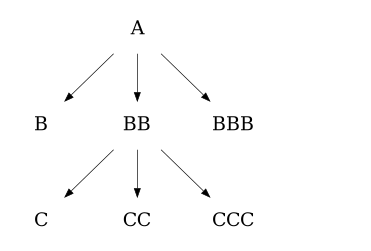
Trees: longhand
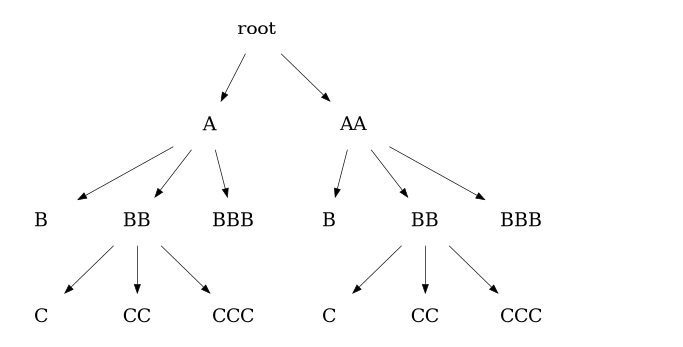
Trees: longhand
"""
A
/ | \
B BB BBB
/| \
C CC CCC
"""
from parsearg.data_structures import Tree, Node, Key
tree = Tree('A', children=[
Tree('B', []),
Tree('BB', children=[
Tree('C', []),
Tree('CC', []),
Tree('CCC', [])
]),
Tree('BBB', []),
])
print(tree.show(quiet=True))
A
B
BB
C
CC
CCC
BBB
Trees: longhand
`Tree`<- function(value=NULL, children=NULL) {
value<- force(value)
children<- force(children)
if (is.null(children))
children<- list()
.Value<- function(name=NULL, key=NULL, d=NULL) {
`check`<- function(x) {
if (!is.null(x))
assert(class(x)=="character")
}
check(name)
check(key)
if (!is.null(d)) {
assert(
class(d)=="list",
!is.null(key)
)
payload=d[[key]]
}
list(
name=name,
key=key,
payload=d
)
}
.show<- function(level=0, indent = '\t', quiet=FALSE) {
`.is_empty`<- function(tree) {
is.null(tree$value) && length(tree$children) == 0
}
o<- list()
`.show`<- function(tree, level, indent) {
# depth-first search (DFS)
if (.is_empty(tree)) return
o<- c(o, sprintf("%s%s", strrep(indent, level), tree$value))
for (child in tree$children) {
.show(child, level=level+1, indent=indent)
}
}
self<- Tree(value, children)
.show(self, level, indent)
o = paste0(paste0(o, collapse='\n'), "\n")
if (!quiet) print(o)
o
}
structure(
list(
`value` = value,
`children` = children,
`show` = .show,
`Value` = .Value
),
class="Tree"
)
}
Trees: longhand
Tree('A', children=list(
Tree('B'),
Tree('BB', children=list(
Tree('C'),
Tree('CC'),
Tree('CCC')
)),
Tree('BBB')
))$show(quiet=TRUE, indent=" ") %>% cat
A
B
BB
C
CC
CCC
BBB
Trees: shorthand
list(
'A',
'A|B',
'A|BB',
'A|BB|C',
'A|BB|CC',
'A|BB|CCC',
'A|BBB'
)

Trees: shorthand
Non-terminating nodes:
c(
'A',
'A|BB'
)
Terminating nodes (leaves):
c(
'A|B',
'A|BB|C',
'A|BB|CC',
'A|BB|CCC',
'A|BBB'
)

Trees: longhand/shorthand
Trees: longhand/shorthand
parsearg transforms a list,
representing the tree's nodes, into a Tree:
names of the list are shorthand for the tree's nodes and the values of the list are the nodes' payloads;list for ease of specification;Tree to avail of the data structure's properties.
UCLI @ Declarative
Data, not actions
argparse
alone is nothing if not an exercise in imperative programming, and this
has negative consequences:
A concrete abstract tree
cmd A BB CCC -c -v
cmd A B -c -v
cmd A B -c --verbose
view = list(
`A` = list(
`callback` = make_callback('A'),
`-c` = list(`help` = 'A [optional pi]', `action` = 'store_const', `const` = 3.141593),
`-v|--verbose` = list(`help` = 'A verbosity', `action` = 'store_true')
),
`A|B` = list(
`callback` = make_callback('A_B'),
`-c` = list(`help` = 'A B [optional pi]', `action` = 'store_const', `const` = 3.141593),
`-v|--verbose` = list(`help` = 'A B verbosity', `action` = 'store_true')
),
`A|BB` = list(
`callback` = make_callback('A_BB'),
`-c` = list(`help` = 'A BB [optional pi]', `action` = 'store_const', `const` = 3.141593),
`-v|--verbose` = list(`help` = 'A BB erbosity', `action` = 'store_true')
),
`A|BB|C` = list(
`callback` = make_callback('A_BB_C'),
`-c` = list(`help` = 'A BB C [optional pi]', `action` = 'store_const', `const` = 3.141593),
`-v|--verbose` = list(`help` = 'A BB C verbosity', `action` = 'store_true')
),
`A|BB|CC` = list(
`callback` = make_callback('A_BB_CC'),
`-c` = list(`help` = 'A BB CC [optional pi]', `action` = 'store_const', `const` = 3.141593),
`-v|--verbose` = list(`help` = 'A BB CC verbosity', `action` = 'store_true')
),
`A|BB|CCC` = list(
`callback` = make_callback('A_BB_CCC'),
`-c` = list(`help` = 'A BB CCC [optional pi]', `action` = 'store_const', `const` = 3.141593),
`-v|--verbose` = list(`help` = 'A BB CCC verbosity', `action` = 'store_true')
),
`A|BBB` = list(
`callback` = make_callback('A_BBB'),
`-c` = list(`help` = 'A BBB [optional pi]', `action` = 'store_const', `const` = 3.141593),
`-v|--verbose` = list(`help` = 'A BBB verbosity', `action` = 'store_true')
)
)
UCLI @ MVC
Separation of concerns
argparse has everything we need in terms of functionality;
it's just clunky to use
Separation of concerns
parsearg
is a layer
over argparse that exposes argparse's functionality via
a list:
list is the View component of the Model-View-Controller ("MVC")list embeds callbacks from the Controller component, achieving a clean separation of duties;dict, the CLI design can be expressed in a declarative way.
Separation of concerns
parsearg manifests the intention
of the CLI design without having to specify how that design is implemented
in terms of argparse's parsers and subparsers
(parsearg does that for you)
parsearg
How does it work?
Helper functions: Key
# 1. take key
key = 'A|B|C'Helper functions: Key
# 2. split string
sep = '|'
print( Key.split(key) )
['A', '|', 'B', '|', 'C']
Helper functions: Key
# 3. unflatten the split key (i.e. create a nested list)
unflattened = Key.unflatten(Key.split(key))
print(unflattened)
['A', ['B', ['C']]]
Helper functions: Node
# 4. create a Node from the unflattened list
node = Node.from_nested_list(unflattened)
print(node)
('A', ['B', ['C']])
Helper functions: Node
# 5. the node can now be shifted until the empty node is reached
print(node < 0)
print(node < 1)
print(node < 2)
print(node < 3)
('A', ['B', ['C']])
('B', ['C'])
('C', [])
(None, [])
Helper functions: Key to Node
print( key )
print( Key.to_node(key) )
A|B|C
('A', ['B', ['C']])
Helper functions: What does a Node do?
key = 'A|B|C'
n = Key.to_node(key)
i = 0
while not n.is_empty():
i += 1
n = node < i
print(i)
print(node < i)
3 (None, [])
Helper functions: Track a payload
print( Key(key).key )
A|B|C
Helper functions: Track a payload
payload = 3.141593
d = {key: payload}
print( Key(key, d=d).d )
{'A|BB|C': 3.141593}
Helper functions: Track a payload
print( Key(key).value )
print( type(Key(key).value) )
('A', ['BB', ['C']])
Helper functions: Track a payload
payload = 3.141593
d = {key: payload}
print( Key(key, d).payload )
3.141593
Helper functions: Shifting a Key
print( Key(key) )
# same thing:
print( Key(key) < 0 )
# real shifts:
print( Key(key) < 1 )
print( Key(key) < 2 )
print( Key(key) < 3 )
# same thing:
print( Key(key) < 4 )
'A|BB|C': ('A', ['BB', ['C']])
'A|BB|C': ('A', ['BB', ['C']])
'A|BB|C': ('BB', ['C'])
'A|BB|C': ('C', [])
'A|BB|C': (None, [])
'A|BB|C': (None, [])
parsearg: The Guts
import sys
import argparse
from parsearg.data_structures import (
is_empty,
Tree,
Key,
)
from parsearg.utils import (
is_valid,
print_list,
is_list_of,
)
class ParseArg:
def __init__(self, d, root_name='root'):
assert isinstance(d, dict) and is_valid(d)
self.d = d
self.tree = ParseArg.to_tree(self.d, root_name=root_name)
self.parser = argparse.ArgumentParser(add_help=True)
ParseArg.make_subparsers(self.tree, self.parser)
def parse_args(self, args):
args = args.split() if isinstance(args, str) else args
return self.parser.parse_args(args)
@staticmethod
def make_subparsers(tree, parser):
def argparse_argument_name_or_flags(keys):
keys = keys.split('|')
keys = list(map(lambda x: x.strip(' \t\n\r'), keys))
return keys
def make_parser(node, subparsers):
assert type(node.value) == Tree.Value
parser = subparsers.add_parser(node.value.name)
# print(f'node = {node.value}')
if node.value.payload is not None:
for key, value in node.value.payload.items():
if key == 'callback':
parser.set_defaults(
callback=value
)
else:
parser.add_argument(
*argparse_argument_name_or_flags(key), **value
)
if len(node.children):
subparsers = parser.add_subparsers()
for child in node.children:
make_parser(child, subparsers)
if not tree.is_empty():
subparsers = parser.add_subparsers()
for child in tree.children:
make_parser(child, subparsers)
@staticmethod
def to_tree(d, root_name='root'):
assert isinstance(d, dict)
nodes = map(lambda key: Key(key), d.keys())
nodes = list(filter(lambda x: not x.is_empty(), nodes))
def _to_tree(x):
if isinstance(x, list) and len(x)==1 and x[0].is_leaf():
x = x[0]
return Tree(
Tree.Value(name=x.value.head(), key=x.key, d=d)
)
else:
name = set(map(lambda x: x.value.head(), x))
assert len(name)==1
name = name.pop()
o = []
shifted = list(map(lambda x: x < 1, x))
# optional arguments added to node itself
tree = None
empty = list(filter(lambda x: x.is_empty(), shifted))
assert len(empty) <= 1
if len(empty):
x = empty[0]
tree = Tree(
Tree.Value(name = name, key=x.key, d=d)
)
# arguments added to child nodes
children = list(filter(lambda x: not x.is_empty(), shifted))
child_names = set(map(lambda x: x.value.head(), children))
for child_name in child_names:
child = list(filter(lambda x: x.value.head() == child_name, children))
o += [_to_tree(child)]
if tree is not None:
tree.children = o
else:
tree = Tree(Tree.Value(name=name, key=None), children=o)
return tree
o = []
for name in set(map(lambda x: x.value.head(), nodes)):
node = list(filter(lambda x: x.value.head()==name, nodes))
o += [_to_tree(node)]
return Tree(root_name, children=o)
Python: Complete Program
import sys
from parsearg import ParseArg
from spark import (
spark_start_cluster,
spark_stop_cluster,
)
from hdfs import (
hdfs_start,
hdfs_stop,
)
view = {
'spark|start': {
'callback': spark_start_cluster,
'--instance': {
'help': 'Spark cluster instance',
'default': 'instance-1',
'choices': ['instance-1', 'instance-2'],
},
},
'spark|stop': {
'callback': spark_stop_cluster,
'--instance': {
'help': 'Spark cluster instance',
'default': 'instance-1',
'choices': ['instance-1', 'instance-2'],
},
},
'hdfs|start': {
'callback': hdfs_start,
'help': 'Start Hadoop',
},
'hdfs|stop': {
'callback': hdfs_stop,
'help': 'Stop Hadoop',
},
}
def main(args: list)-> None:
parser = ParseArg(view)
ns = parser.parse_args(args)
result = ns.callback(ns)
if __name__ == "__main__":
args = sys.argv[1:] if len(sys.argv) > 1 else []
main(' '.join(args))
R: Complete Program
#!/usr/bin/Rscript --no-init-file
suppressPackageStartupMessages(library(parsearg))
`spark_start_cluster`<- function(args)
cat(sprintf("starting Spark cluster instance=%s", args.instance)),
`spark_stop_cluster`<- function(args)
cat(sprintf("stopping Spark cluster instance=%s", args.instance)),
`hdfs_start`<- function(args)
cat(sprintf("starting HDFS cluster instance=%s", args.instance)),
`hdfs_stop`<- function(args)
cat(sprintf("stopping HDFS cluster instance=%s", args.instance)),
view = list(
`spark|start|cluster` = list(
`callback` = spark_start_cluster,
`--instance` = list(
`help` = 'Spark cluster instance',
`default` = 'instance-1',
`choices` = c('instance-1', 'instance-2')
)
),
`spark|stop|cluster` = list(
`callback` = spark_stop_cluster,
`--instance` = list(
`help` = 'Spark cluster instance',
`default` = 'instance-1',
`choices` = c('instance-1', 'instance-2')
)
),
`hdfs|start` = list(
`callback` = hdfs_start,
`--instance` = list(
`help` = 'Start Hadoop'
)
),
`hdfs|stop` = list(
`callback` = hdfs_stop,
`--instance` = list(
`help` = 'Stop Hadoop'
)
)
)
`main`<- function(args=commandArgs(trailingOnly=TRUE)) {
parser<- ParseArg(view)
ns<- parser$parse_args(args)
result<- ns$callback(ns)
}
main()
Parting thought
Michael Kane (Parlor West Loop, Chicago, 2022-06-03)